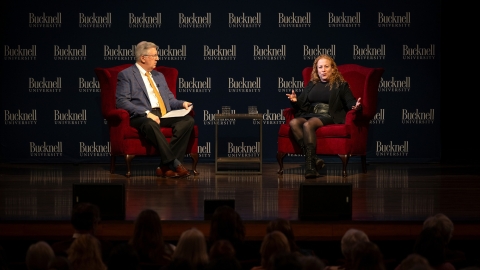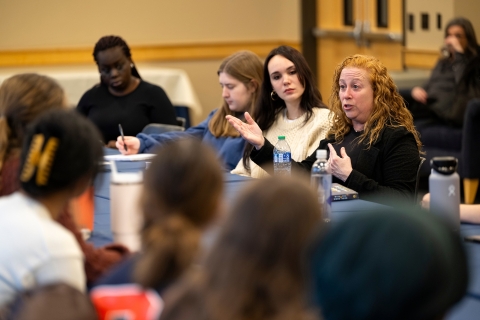
Author Jodi Picoult Discusses Book Bans at Bucknell Forum
January 24, 2024
Bestselling author Jodi Picoult spoke on the theme “Freedom of Expression” with President John Bravman at the Bucknell Forum. Photo by Emily Paine, Communications
Book bans are not a new phenomenon, and historically they are often a telltale symptom of an increasingly reactionary political environment. For bestselling author Jodi Picoult, a recent and unprecedented proliferation of book bans across the country represents a growing threat to the freedom of expression.
Picoult shared her assessment on the role of literature in politics as the third speaker in Bucknell’s 2023-2024 Forum series, which focuses on the theme "Freedom of Expression." After a private question-and-answer session with students from a creative writing class, the author engaged in a conversation with President John Bravman in front of a rapt audience on Jan. 23 at the Weis Center for Performing Arts.
The author of 28 novels that have been translated into more than 30 languages around the world, Picoult is no stranger to tackling a wide array of social issues in her writing, including racism, assisted suicide, LGBTQ rights, school shootings and the death penalty. For her, writing is intimately linked to activism, advocacy and education, as it functions as an ideal medium for navigating the nuances of complex and sensitive topics.
In her conversation with Bravman, Picoult described the moment that she first learned that her own books had been banned. She was in the United Kingdom overseeing the musical adaptation of Marcus Zusak’s The Book Thief, a historical novel that unfolds under the oppressive Nazi regime of World War II. It was during a rehearsal of a scene in which an actor playing a Nazi burns a book that Picoult received some surprising news.
"A notification popped up on a computer screen telling me that my books had been banned in Martin County, Florida. Ninety-two books had been banned by one individual, and 20 of those 92 were my books," said Picoult.
What was both alarming and confusing, Picoult said, was not necessarily that her books had been banned, but the reason why they had: someone from a conservative political organization had reported them as containing “mature” and “objectionable” content.
"I think that the fact that now there's this slide toward [labeling things] mature content is really dangerous. Nobody has defined what mature content is. And that's a real problem," said Picoult, who explained that an exponential increase in bookbans has coincided with the introduction of parental rights bills by conservative legislatures.

Author Jodi Picoult participated in a question-and-answer session with students during a creative writing class. Photo by Emily Paine, Communications
While the concept of a parental rights bill sounds benign on its face, Picoult said these bills allow politically motivated individuals to silence important stories, especially those of underrepresented and historically marginalized populations — even if they have not personally read them.
“There's nothing wrong with wanting to keep track of your kid’s education. The problem comes when you decide you can keep track of another person's kid's education. That is a big problem. And that is exactly what the rationale is being used right now for all of these book bans," said Picoult.
Picoult said that it is particularly important for authors with well-established readerships to use their platforms to call attention to attacks on freedom of expression.
"The role of the ally is to speak up on behalf of those who can't or shouldn't have to. And so it's important for authors like me, who are straight, white and cisgender, to be able to speak up on behalf of other authors who are not, and say those books and those stories matter," she said.
For Picoult, the marked uptick in book bans across the U.S. is troubling, though she is also hopeful about the future. As she explained to the crowd, the people leading the efforts to ban books remain a small — although especially vocal — minority.
"We know that the vast majority of Americans do not want books banned in schools," said Picoult, issuing a challenge to the Bucknell community to take on an active role in protecting important stories and, in turn, preserving the freedom of expression.
Up Next
The Bucknell Forum speaker series will continue this spring with George M. Johnson on Feb. 27. Johnson is an award-winning writer, activist, and author of the New York Times bestselling Young Adult memoir All Boys Aren't Blue. The final speaker of this year's series is Academy Award-winning actor and activist Jane Fonda, who will speak in the Weis Center on March 19.

